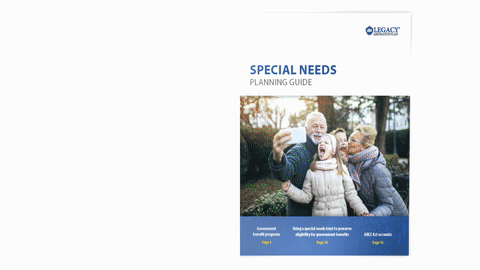As parents, one of our deepest instincts is to protect and provide for our children. From their first steps to their journey into adulthood, we continuously plan for their well-being. However, one aspect that often gets overlooked by parents is what happens when they no longer are able to care for them due to incapacity or after passing away.
That’s why estate planning is not just a task for the wealthy; it's a crucial step for all parents who want to ensure their children are cared for, even when they cannot be there physically.
One way you can enhance your ability to provide for your children is through comprehensive estate planning. With a thorough and well-designed estate plan in place, you can serve as a provider for (and protector of) your children, even after you die.
When most people begin thinking about creating an estate plan, they usually start by contemplating how they will distribute their assets after they die. At a basic level, a parent’s typical estate planning involves executing a last will and testament that divides up one's assets, in equal fractions, to each of that person's children. For some, this may be an adequate way to plan for the distribution of their assets.
While a basic will distributing your assets is necessary, comprehensive estate planning allows you to address far more than just how your property and belongings will be divided. Comprehensive estate planning provides comfort in knowing special needs and asset management concerns specific to your family can all be handled in advance.
Why is estate planning important if you have children with special needs?
For parents of special needs children, planning for the future is more than a matter of financial security — it's a deeply personal journey that involves ensuring the lifelong care and well-being of a loved one. One of the most significant challenges in this journey is ensuring that your child continues to qualify for essential government benefits while also receiving the full benefit of their inheritance. This is where a specialized tool, the supplemental benefits trust, becomes invaluable.

Parents caring for children rely heavily on needs-based government assistance programs to cover astronomical medical and therapeutic support costs. Eligibility for benefits like Medicaid, Supplemental Security Income, housing and in-home care services are essential lifelines but require recipients to demonstrate financial need. An inheritance or personal injury settlement could make a special needs child ineligible for these programs, despite these assets being intended solely to enhance quality of life.
This represents one of a family’s greatest estate planning concerns. However, the supplemental benefits trust offers a solution.
What is a supplemental benefits trust?
A supplemental benefits trust is a legal tool allowing families to provide assets to improve a disabled child’s comfort and happiness without reducing vital public assistance benefits. Funds are allocated to a customized trust with a third-party trustee overseeing use and adhering to very specific guidelines permitted by Medicaid and SSI. As long as trust assets are utilized only for permissible “supplemental” purchases not covered under government programs, recipients maintain eligibility. The trust cannot be used for housing, medical or food costs but may fund things like educational costs, equipment, therapy extras, trips, personalized caretakers and housing upgrades adding enjoyment and dignity.
What could go wrong without a supplemental benefits trust?
Without a supplemental benefits trust, several complications can arise for children with special needs, particularly in terms of their financial security and eligibility for government benefits. Here's an overview of potential issues:

- Loss of government benefits. Many government assistance programs, like Medicaid or Supplemental Security Income, are needs-based and have strict asset limits. Inheriting money directly can cause a special needs child to exceed these limits, leading to a loss of these critical benefits. A supplemental benefits trust, by contrast, holds assets in a way that doesn’t count against these limits.
- Mismanagement of funds. If a special needs individual inherits assets directly, there may be concerns about their ability to manage the money effectively, especially if they have cognitive impairments or lack financial acumen. A supplemental benefits trust ensures that a responsible trustee manages and distributes the funds according to the beneficiary's best interests.
- Vulnerability to exploitation. A direct inheritance can make a special needs beneficiary a target for financial abuse or exploitation. With a supplemental benefits trust, the trustee oversees the assets, providing a layer of protection against such risks.
- Impact on future care planning. Without a supplemental benefits trust, a lump-sum inheritance could be quickly depleted due to the high cost of specialized care, leaving the individual with limited resources in the long term. A supplemental benefits trust allows for more strategic and long-term planning of the beneficiary’s care and financial needs.
- Legal and administrative complications. Directly inheriting assets may create legal and administrative burdens for the special needs individual, especially if they are not capable of handling complex legal and financial matters. A supplemental benefits trust simplifies this process, with the trustee handling these responsibilities.
- Challenges in meeting specific needs. A supplemental benefits trust can be tailored to address the unique needs of the beneficiary, such as special medical equipment, therapies or personal care services. Without such a trust, there might not be a structured way to ensure funds are used specifically for these necessary expenses.
- Estate recovery issues. In some cases, states can recover costs for care from the estates of individuals who received state benefits. Assets in a supplemental benefits trust are generally protected from such claims.
- Difficulty in accessing quality care. Loss of government benefits due to direct inheritance can mean losing access to specialized health care and services that are often not affordable out-of-pocket. A supplemental benefits trust helps maintain eligibility for these essential services.
The following is an example of the significant risk of a special needs child losing access to government benefits, facing financial mismanagement and being exposed to various other vulnerabilities.

Sarah is a 12-year old quadriplegic requiring permanent residential nursing assistance costing $13,500 monthly that her family could never independently fund long-term. However, Medicaid covers Sarah’s nursing facility mostly in full. Her grandparents, wanting to enhance Sarah’s restricted quality of life stuck in a hospital-like facility, decide to gift $750,000 specifically for her happiness. Without strategic planning, this could make Sarah ineligible for $162,000 in annual benefits covering her survival needs. Instead, they establish a supplemental benefits trust stating funds must only be utilized for Sarah’s supplemental extras like specialized therapy, an electric wheelchair providing mobility independence, a computer/voice system enabling communication, personal care items, television and music providing sensory stimulation and visits facilitating essential emotional bonding with family unable to care for her at home full-time. This trust safeguards Sarah’s government aid while immensely improving her life beyond bare necessities.
Alternatively, had Sarah’s family given funds without protecting them appropriately in trust for her benefit, Medicaid would likely force the spend down of most funds on Sarah’s facility bills. Sarah could be forced into an unsuitable Medicaid-only nursing home for that period.
As demonstrated, the implementation of a supplemental benefits trust can profoundly impact the comfort and dignity of a special needs child without reducing essential public assistance safeguarding their fundamental medical and life needs. This represents one of estate planning’s most emotionally charged yet rewarding challenges, truly bettering heirs’ daily realities through caring forethought.
How does a supplemental benefits trust work?
A supplemental benefits trust is a legal arrangement where a trustee holds and manages assets for the benefit of a person with disabilities. This trust can be established while the parents are alive (a living trust) or as part of a will (a testamentary trust).
Choosing a reliable and trustworthy person or institution to manage the trust is crucial. The trustee's role includes making disbursements for the beneficiary’s needs and managing the trust's assets responsibly.
The trust can be funded with a variety of assets, including cash, stocks, real estate or life insurance proceeds. It’s essential to ensure that the trust is adequately funded to meet the child’s needs over their lifetime.
The trust's funds are used to pay for expenses that are not covered by government benefits. This can include medical expenses, education, transportation and personal care.
Can a spendthrift trust protect my child’s inheritance?
Another variety of trust planning that can benefit some families is a spendthrift trust. Some people may associate this type of planning with children who have problems in their lives, such as gambling addictions, substance abuse problems, creditor issues, a failing marriage with a money-hungry spouse or just a notoriously terrible ability at managing money. Without a doubt, these situations are ones where a spendthrift trust may be able to help.
What is a spendthrift trust?

A spendthrift trust is an effective estate planning tool designed to protect a beneficiary from squandering their inheritance. It ensures that the inheritance is not only preserved but also used in a way that is beneficial to the beneficiary over the long term. Here's how a spendthrift trust can achieve this:
- Controlled distribution of assets. The trust controls when and how much money the beneficiary receives. Instead of receiving a lump sum that they might spend impulsively, the beneficiary gets smaller, regular distributions. This can be set up as monthly allowances or distributions for specific purposes like education, housing or health care.
- Protection from creditors. Spendthrift trusts typically include a clause that prevents creditors from accessing the trust funds to satisfy the beneficiary’s debts. This protection ensures that the beneficiary’s inheritance is not eroded by their debts or financial misjudgments.
- Trusted management by a trustee. A trustee, appointed by the grantor (the person who creates the trust), manages the trust. This trustee is responsible for making decisions about investment and distribution of the trust’s assets. The trustee’s management helps ensure that the assets are not only protected from the beneficiary’s imprudence but also grown responsibly.
- Conditional distributions. The trust can include conditions that the beneficiary must meet to receive distributions. These might include completing education, maintaining employment or achieving certain life milestones. These conditions can encourage responsible behavior and reduce the likelihood of wasteful spending.
- Flexibility in response to changing circumstances. The trust can be structured to allow the trustee to adjust distributions based on the beneficiary’s circumstances and needs. For instance, if the beneficiary demonstrates increased financial responsibility or faces an unforeseen hardship, the trustee can modify the distribution plan accordingly.
- Long-term financial security. By controlling distributions, the trust can provide for the beneficiary’s long-term needs. This is particularly useful for beneficiaries who may not have the ability to manage large sums of money or those who might be susceptible to financial exploitation.
Conclusion
Estate planning is critically important for all parents, but especially for those with special needs children. By creating thoughtfully designed trusts like a supplemental benefits trust or a spendthrift trust, parents can ensure their child's financial future and ongoing care in the event of their own incapacity or death. These specialized trusts allow parents to provide supplemental funds to enhance their child's quality of life without compromising essential government aid that covers fundamental medical and living assistance expenses. Without such strategic planning, special needs children risk losing public benefits, having funds mismanaged, and facing abuse and expense recovery claims down the road.
A spendthrift trust is a strategic way to provide for a beneficiary who may not have the discipline or capacity to manage a large inheritance. It offers a balanced approach, ensuring the beneficiary's needs are met while protecting the inheritance from rapid depletion due to reckless spending, creditor claims or poor financial management.



